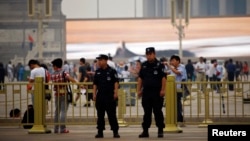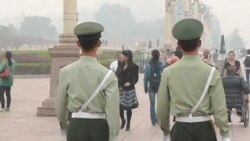BEIJING —
Chinese authorities have taken aggressive steps to snuff out any discussion of the Communist Party’s brutal crackdown of pro-democracy protesters in Tiananmen Square, even as some tried to mark the 24th anniversary of the bloody incident online and in public.
Each year, the anniversary of the 1989 Tiananmen protests is a sensitive time for authorities in Beijing - who bristle at any criticism of the incident and calls for a fuller official account of what happened more than two decades ago.
Authorities moved quickly this week to block a long list of search topics on social media websites.
On China’s Twitter-like Weibo microblog service, users could not even post candle icons. Candle icons are a popular way of expressing grief and have been used widely in recent weeks to mark tragedies such as China’s recent Ya’An earthquake and the Boston Marathon bombings
Some, like Rachel Lu, found ways around the ban. “Instead people have been posting photos of candles to show they remember [the June 4th incident],” she said.
Lu is editor of Tea Leaf Nation, a website that monitors Chinese media. She said what is remarkable is that many who are posting comments are using their real names.
“They are also coming out and sharing their memories of what happened. So obviously this is not on an anonymous basis," she added. "They are real people and they are sometimes in very prominent positions in society.”
The government has branded the protests a counter-revolutionary rebellion and refuses to re-examine what happened. Instead it focuses on just how far China has come since then.
The long list of blocked search terms, included words such as 'Tiananmen', '64' or 'June 4th' and 'tank'. When typed into social media search engines, the response would say such keywords were removed in accordance with relevant laws.
'May 35th' - a clever equivalent of June 4th designed to get around the Internet ban and even 'today' and 'tomorrow' were also among search topics blocked.
One user's postings in the early hours Tuesday included a picture of sky in China’s capital and read: “Beijing’s sky today is as dark as on June 4th of the 78th of the Republic,’ a reference to 1989. The Republic of China was founded in 1911 at the end of the Qing empire.
Video clip: Tiananmen Square, past and present
Another user complained about how censors had promptly deleted a post about how they were “in a very somber mood.”
The post said, “any time this day approaches, people do not even have the right to grieve.”
Percy Alpha, (a pseudonym) is with GreatFire.Org, a website that monitors Chinese Internet censorship. “Most of the stuff getting around is very implicit, so if you do not know the incident at all, you won’t get the idea ... although it is kind of an improvement, you cannot actually reach the people who know nothing at all about this incident,” he said.
Residents in Hong Kong last year launched a black-shirt campaign to mark the anniversary and activists in China have expressed interest in joining the movement this year.
Beijing-based activist Hu Jia has launched an appeal online, urging people to wear black on Tuesday.
Ai Xiaomin, an activist in China’s southern Guangzhou province said she will do the same.
Ai said June 4th is a day of anguish for those who lost their loved ones and we should share their burden of pain and together call for a true accounting of what happened.
In the past week, VOA has run into numerous obstacles attempting to conduct interviews on university campuses in Beijing and when trying to speak directly with the families of those killed. The interviews on university campuses, which are typically freely accessible, were completely unrelated to the events of June 4th.
Reporters were blocked and told to go home Tuesday when they tried to visit Wanan cemetery, a graveyard mothers of the victims visit every year.
You Weijie is a member of the Tiananmen Mothers, a group of parents, friends and families of those killed. She said June 4th will never fade from people’s memories.
She said although the government censors the Internet and hinders the media from reporting on it, in their hearts the people will never forget what happened, especially those in Beijing.
Although protests are banned in China, organizers of a candlelight vigil in Hong Kong say they expect a record turnout of 180,000.
Each year, the anniversary of the 1989 Tiananmen protests is a sensitive time for authorities in Beijing - who bristle at any criticism of the incident and calls for a fuller official account of what happened more than two decades ago.
Authorities moved quickly this week to block a long list of search topics on social media websites.
On China’s Twitter-like Weibo microblog service, users could not even post candle icons. Candle icons are a popular way of expressing grief and have been used widely in recent weeks to mark tragedies such as China’s recent Ya’An earthquake and the Boston Marathon bombings
Some, like Rachel Lu, found ways around the ban. “Instead people have been posting photos of candles to show they remember [the June 4th incident],” she said.
Lu is editor of Tea Leaf Nation, a website that monitors Chinese media. She said what is remarkable is that many who are posting comments are using their real names.
“They are also coming out and sharing their memories of what happened. So obviously this is not on an anonymous basis," she added. "They are real people and they are sometimes in very prominent positions in society.”
The government has branded the protests a counter-revolutionary rebellion and refuses to re-examine what happened. Instead it focuses on just how far China has come since then.
The long list of blocked search terms, included words such as 'Tiananmen', '64' or 'June 4th' and 'tank'. When typed into social media search engines, the response would say such keywords were removed in accordance with relevant laws.
'May 35th' - a clever equivalent of June 4th designed to get around the Internet ban and even 'today' and 'tomorrow' were also among search topics blocked.
One user's postings in the early hours Tuesday included a picture of sky in China’s capital and read: “Beijing’s sky today is as dark as on June 4th of the 78th of the Republic,’ a reference to 1989. The Republic of China was founded in 1911 at the end of the Qing empire.
Video clip: Tiananmen Square, past and present
Another user complained about how censors had promptly deleted a post about how they were “in a very somber mood.”
The post said, “any time this day approaches, people do not even have the right to grieve.”
Percy Alpha, (a pseudonym) is with GreatFire.Org, a website that monitors Chinese Internet censorship. “Most of the stuff getting around is very implicit, so if you do not know the incident at all, you won’t get the idea ... although it is kind of an improvement, you cannot actually reach the people who know nothing at all about this incident,” he said.
Residents in Hong Kong last year launched a black-shirt campaign to mark the anniversary and activists in China have expressed interest in joining the movement this year.
Beijing-based activist Hu Jia has launched an appeal online, urging people to wear black on Tuesday.
Ai Xiaomin, an activist in China’s southern Guangzhou province said she will do the same.
Ai said June 4th is a day of anguish for those who lost their loved ones and we should share their burden of pain and together call for a true accounting of what happened.
In the past week, VOA has run into numerous obstacles attempting to conduct interviews on university campuses in Beijing and when trying to speak directly with the families of those killed. The interviews on university campuses, which are typically freely accessible, were completely unrelated to the events of June 4th.
Reporters were blocked and told to go home Tuesday when they tried to visit Wanan cemetery, a graveyard mothers of the victims visit every year.
You Weijie is a member of the Tiananmen Mothers, a group of parents, friends and families of those killed. She said June 4th will never fade from people’s memories.
She said although the government censors the Internet and hinders the media from reporting on it, in their hearts the people will never forget what happened, especially those in Beijing.
Although protests are banned in China, organizers of a candlelight vigil in Hong Kong say they expect a record turnout of 180,000.






